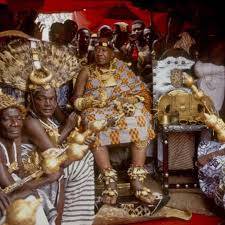The Asante Kingdom, also known as the Ashanti Region, is a historical and prominent West African state located in what is now modern-day Ghana. Ashanti Kingdom has a rich and complex history that spans several centuries. Here is a more detailed history of the Asante Kingdom:
1. Formation and Early History: The Asante Kingdom was founded in the late 17th century in the region of present-day Ghana by Osei Tutu, a military leader.
Osei Tutu, in alliance with a spiritual leader and priest named Okomfo Anokye, united several Akan-speaking states and chiefdoms under the Asante Confederacy.
2. Expansion and Military Dominance: Under the leadership of successive Asantehenes (kings), the Asante Kingdom rapidly expanded its territory through military conquests and diplomatic alliances.
The Asante military, known for its disciplined and well-organized forces, conquered neighboring regions, including the Fante and Akuapem areas, and established control over the valuable gold-producing regions.
3. Trade and the Gold Coast: The Asante Kingdom's control over gold resources and trade routes made it a major player in the trans-Saharan and trans-Atlantic trade networks.
Europeans, particularly the British, established trade relations with the Asante, with the kingdom exporting gold and slaves.
4. Conflicts with European Powers: The 19th century witnessed conflicts and wars between the Asante Kingdom and European powers, notably the British.
The Anglo-Asante Wars (1823-1900) resulted in the loss of some territory and British influence, although the Asante fiercely resisted British expansion.
5. British Colonial Rule: In 1900, the British succeeded in establishing control over the Asante Kingdom, marking the end of its independence.
The British exiled the Asantehene (king) Prempeh I and dismantled aspects of traditional Asante governance.
6. Independence and Restoration: Ghana gained independence from British colonial rule in 1957, and the Asante Kingdom was restored.
The Asantehene regained his position and continues to play a significant role in the cultural, traditional, and political life of the region.
7. Contemporary Role: Today, the Asante Kingdom exists within the modern Ghanaian state as a traditional institution.
The Asantehene serves as a symbol of Asante cultural and political identity, presiding over various traditional ceremonies and rituals.
In conclusion the Asante Kingdom's history is marked by its military prowess, economic prosperity, and cultural traditions. It remains an integral part of Ghana's historical and cultural heritage, preserving its unique identity within the broader context of the nation.




No comments yet
Be the first to share your thoughts!